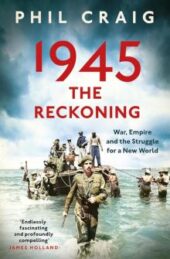The British Army ended the First World War well trained, well led, well equipped and capable of engaging in all arms intensive warfare. Of all the players, on both sides, this army was unquestionably the most capable of deployment against a first class enemy anywhere in the world. Twenty years later it found itself with very much the same equipment, but with very much less of it, and devoid of either the ability or the means to fight a war in Europe against an enemy which had absorbed the lessons of 1918 but which the British had forgotten. It was the British Army that saw to the defeat of the German Army on the battlefield, and whatever German myth later averred, it was the British Army that forced that victory on the Western Front, not the French or the Americans. And yet, in 1939 and 1940 the British were roundly defeated in France and Belgium, Greece, Crete and in North Africa. In this important and almost heart-rending book the authors describe how and why the victors of 1918 were allowed to become incapable of fighting intensive warfare a mere two decades later.
In the first part of the book the authors describe the build up to the First War, and their explanation of the so called ‘Curragh Mutiny’ is much more accurate than many accounts by others. The authors then go on to show how the British government had, albeit reluctantly, accepted a continental commitment in 1914 and had despatched an expeditionary force to Belgium, described then and later as the finest body of troops ever to leave these shores.
The next part shows how and why by the time the Second World War came along the British were incapable, not only of deterring war, but of fighting it: The ‘ten year rule’; the reluctance of governments to spend on defence; the political refusal to contemplate another war in Europe and the reluctance of the public to contemplate another bloodletting like that of the First War; the inability to experiment or to develop tanks and armoured vehicles; the seeming impossibility of reconciling the twin requirements of imperial policing and any commitment to land operations in Europe with the assets available; the myth of the ‘bomber will always get through’ and the absence of any consistent war fighting doctrine, all are lucidly explained.
Much of the fault is shown to lie with politicians, and surely the most disgraceful example of political interference was the sacking of the Chief of the Imperial General Staff (CIGS), by the leaving of a note on his desk by the very dubious Secretary of State for War, Leslie Horeb-Elisha. The generals are not spared, however. Despite restrictions on funding and refusal by governments to accept that another war was looming generals could have spoken out, although it does have to be recognised that in a democracy the civil power is paramount.
From the end of the Cold War and the dissolution of the Soviet Union in 1991 successive British governments have seized on the supposed opportunities offered by the ‘Peace Dividend’ and an assumption that war in Europe had been banished for ever. Policies such as ‘An army smaller but better’ (or smaller but bitter as we who were in it said), ‘Front Line First’, stripping out the logistic units without which no army can hope to fight, and similar fatuous cries have left today’s British Army unable to field more than a single division and that for only a limited time. Many of our tanks are to be mothballed, we have no replacement vehicle readily available for armoured infantry, and the Chief of the General Staff has been sacked for suggesting that yet another reduction in the size of the army is unwise. Now another war in Europe has arrived. We are at war by proxy and if Ukraine does not win then we may have to fight it ourselves – and unless there is a very rapid – and expensive – uplift in our military capacity we may be doomed to watch a Russian victory.
This is a most timely book. and should be read by every student at the Staff College, who will of course already be the converted. More importantly it should be compulsory reading by every politician.
Gordon Corrigan is a historian and writer, and author of The Second World War: A Military History.







